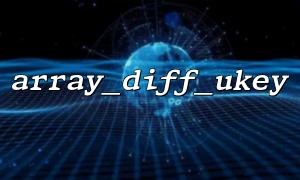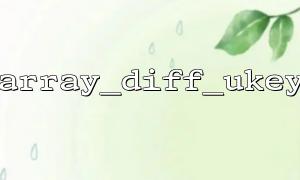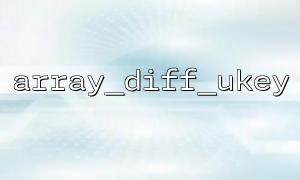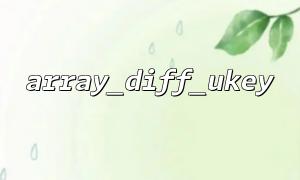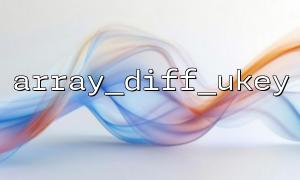In PHP, arrays are a very powerful data structure that allows storing different types of elements, including strings, integers, objects, resources, etc. In most cases, array keys can be strings or integers, which is also the key type we commonly use. However, when we use objects or resources as keys to an array, we may encounter some difficult-to-find errors or behavior that does not meet expectations. This article will explore the problems that may be caused by using objects or resources as array keys in PHP and provide solutions.
In PHP, the keys of an array are managed by hashing (hash). When we use integers or strings as keys, PHP can directly manage keys through its internal hashing mechanism. However, when an object is an array key, PHP cannot directly use the object's value for hash calculations unless the object implements the __toString() method or some special comparison method. Without these methods, PHP will use the hash value of the object as an array key, and this hash value does not always accurately represent the uniqueness of the object.
<?php
class Person {
public $name;
public function __construct($name) {
$this->name = $name;
}
}
$obj1 = new Person("John");
$obj2 = new Person("Doe");
$array = [];
$array[$obj1] = "First object";
$array[$obj2] = "Second object";
// Possible output:Array ( [Person Object] => Second object )
var_dump($array);
?>
In the example above, although we create different objects for $obj1 and $obj2 , PHP may still use their hash values as keys to the array, resulting in unexpected behavior.
To solve this problem, it is recommended to use a unique identifier of the object (such as spl_object_hash() ) or convert the object's properties to a string type (such as through the __toString() method) to ensure that each object's key is unique in the array.
<?php
class Person {
public $name;
public function __construct($name) {
$this->name = $name;
}
public function __toString() {
return $this->name;
}
}
$obj1 = new Person("John");
$obj2 = new Person("Doe");
$array = [];
$array[(string)$obj1] = "First object";
$array[(string)$obj2] = "Second object";
// Output:Array ( [John] => First object [Doe] => Second object )
var_dump($array);
?>
By implementing the __toString() method, we can ensure that each object has a unique and recognizable string representation, thus avoiding the above problems.
In PHP, resource usually refers to a reference to external resources (such as database connections, file handles, etc.). Resource type is a special data type in PHP, which itself has no direct hash representation, and using resources as array keys can cause problems.
When you use a resource as an array key, PHP does not have the resource content directly as a key. Instead, PHP uses the resource's type and identifier combination for hashing. However, since the identifier of the resource may vary in different PHP instances, this makes it impossible to effectively compare the data of the two resource types.
<?php
$resource1 = fopen("file1.txt", "r");
$resource2 = fopen("file2.txt", "r");
$array = [];
$array[$resource1] = "First resource";
$array[$resource2] = "Second resource";
// This may cause problems,Because resource identifiers may vary in different environments
var_dump($array);
?>
It is recommended not to use resources as keys to arrays, especially if the resource identifier changes are not clear. If you do need to use resource data, consider encapsulating the resource in an object and then using the object as an array key, or using other data types that can identify the resource (such as resource ID or other string identifiers) as an array key.
<?php
$resource1 = fopen("file1.txt", "r");
$resource2 = fopen("file2.txt", "r");
$array = [];
$array[(string)$resource1] = "First resource";
$array[(string)$resource2] = "Second resource";
var_dump($array);
?>
In this way, the resource's string identifier ensures the uniqueness of the array keys.
While PHP allows objects and resources to be used as keys to arrays, this practice can raise some unanticipated problems due to the limitations of the hashing mechanism. To ensure the maintainability and stability of the code, it is recommended:
Use strings or integers as keys to arrays.
If you have to use an object, you can consider implementing the __toString() method or using spl_object_hash() to generate a unique representation of the object.
Try to avoid using resources as array keys. If you want to use them, it is recommended to encapsulate resources into objects or use the resource's identifier as array keys.
Hopefully this article helps you understand the problems and solutions that may arise from using objects or resources as array keys in PHP. If you have more questions or need further discussion, please leave a message and communicate!
